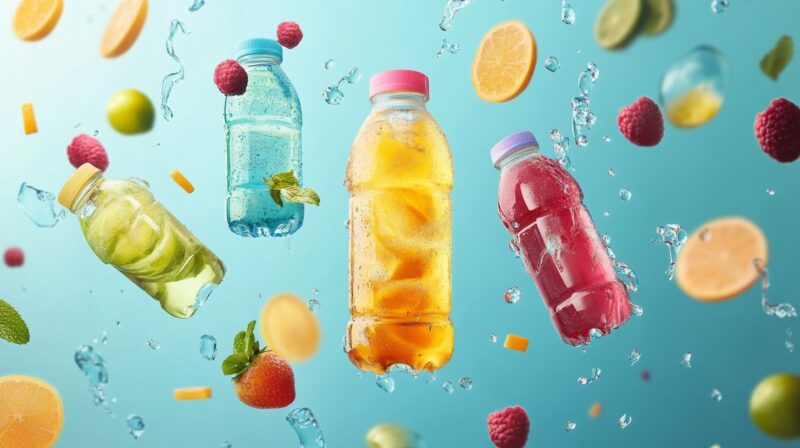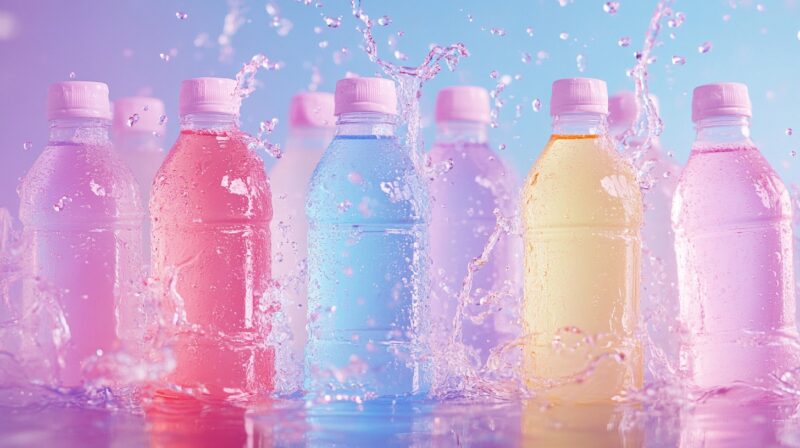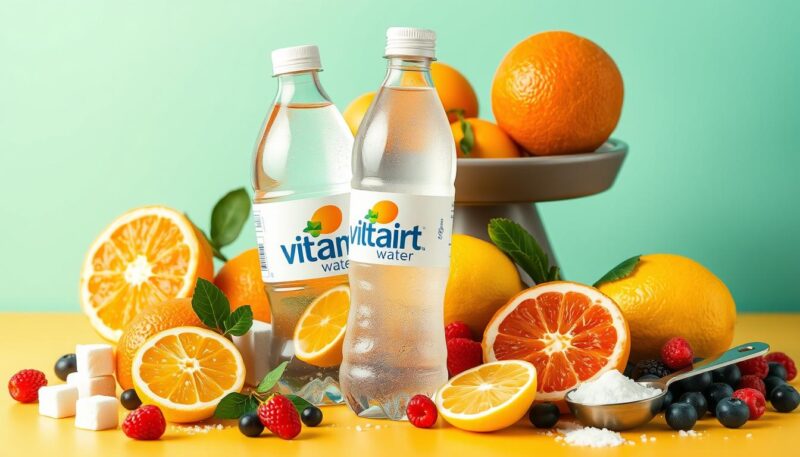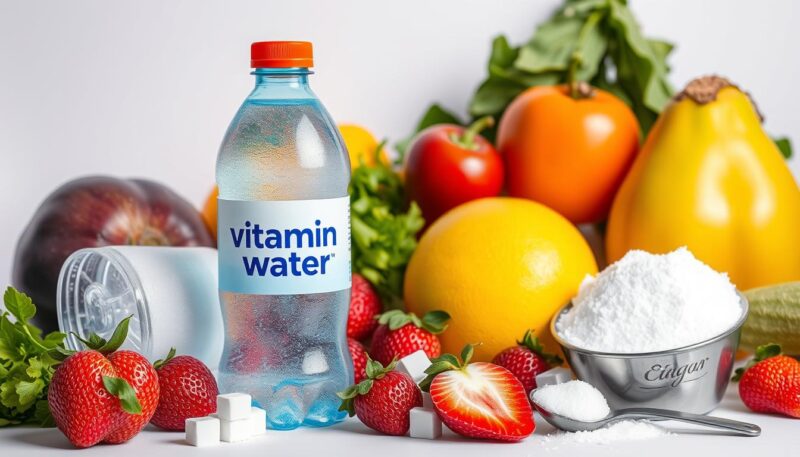As consumers become increasingly mindful of what they drink, the market is flooded with various hydration options, each claiming to be the healthier choice. Among these, Vitamin Water has emerged as a popular contender, boldly positioning itself as a beneficial alternative to ordinary sugary beverages.
With its eye-catching branding and promises of health benefits, you might find yourself wondering: Is vitamin Water healthy or just a sugary disguise?
While it does provide flavors and added vitamins, a closer look at the nutritional content and potential risks reveals that perhaps not all is as it seems.
What is Vitamin Water?
Vitamin water is a flavored beverage that includes an assortment of vitamins and minerals.
The concept emerged around 25 years ago, designed to provide a tastier way to hydrate while offering nutritional benefits.
- The idea of vitamin-infused water gained traction in the late 1990s and early 2000s.
- Glacéau, a product under the Coca-Cola Company, launched in 2000 and remains a leading name in the category.
- Many varieties contain vitamins such as:
- B vitamins – often included to support metabolism and energy levels.
- Vitamin C – commonly added for immune system support.
- Marketed as a refreshing hydration option with added nutritional value.

Different Brands and Flavors
Plateau is among the most recognized names in the vitamin water market, offering a variety of flavors.
Other brands have entered the space, expanding options for consumers. Here are some key players and their features:
| Brand | Key Features |
|---|---|
| Glacéau Vitaminwater | Known for bold flavors such as açai, blueberry pomegranate and lemon lime. Offers varieties with added electrolytes for hydration. |
| Vitaminwater Zero | A lower-calorie option that still delivers added vitamins. Uses alternative sweeteners instead of sugar. |
| Propel | Marketed as a fitness-focused beverage with added electrolytes. Provides light flavors designed to complement hydration after exercise. |
Each brand and flavor caters to different taste preferences, making it easier for consumers to select a drink that fits their needs. The combination of hydration, vitamins, and diverse options helps position vitamin water as a practical alternative to soda.
Nutritional Composition and Sugar Content
| Brand | Flavor | Sugar (grams) | Main Vitamins |
|---|---|---|---|
| Glacéau | Açai Blueberry Pomegranate | 26 | B Vitamins, Vitamin C |
| Vitaminwater | Revive | 32 | B Vitamins |
| Propel | Berry | 0 (zero calories) | Electrolytes, Vitamins B & C |
The nutritional composition of vitamin water varies across brands and flavors, but most contain added sugars, which should not be overlooked.
A 20-ounce bottle of açai blueberry pomegranate vitamin water, for example, includes a substantial 26 grams of added sugar, while many varieties hover around 30 grams.
- Most vitamin water brands contain 25–30 grams of added sugar per 20-ounce serving.
- Consuming high amounts of added sugar can contribute to weight gain, insulin resistance, and other metabolic issues.
- Vitamin-infused water may seem like a better choice than soda or fruit juice, but the sugar levels in some flavors rival those of traditional soft drinks.
- While some products offer added vitamins and electrolytes, it’s essential to weigh those benefits against the sugar intake.
Drinking these beverages in moderation may not cause harm, but habitual consumption can lead to excessive sugar intake. Checking ingredient labels and considering unsweetened alternatives can help maintain a healthier balance.
Grasping the true health implications of Vitamin Water requires looking past its attractive marketing claims. Many assume that this beverage serves as a healthier alternative because of its vitamin and electrolyte content.
Breaking down common misconceptions about Vitamin Water reveals that its sugar content often outweighs any potential health benefits.
Health Claims vs. Reality
Vitamin Water’s advertisements promote its vitamin content, leading consumers to perceive it as a nutritious choice.
While it does contain B vitamins and vitamin C at levels ranging between 50–150% of the recommended daily intake, the reality presents a more complex picture.
- 120 calories per serving
- 32 grams of sugar, which is nearly equivalent to a regular Coke in terms of fructose
Such a high sugar content raises concerns about its actual health benefits. While it does provide some essential nutrients, the added sugars may negate those advantages.
Potential Health Benefits

Vitamin Water does offer hydration along with a variety of vitamins.
- Potassium – supports muscle function and helps maintain proper fluid balance
- Magnesium – aids in nerve function and energy production
For individuals struggling to meet their daily vitamin needs through food alone, it may serve as an occasional supplement.
However, these potential benefits should be weighed against the risks associated with high sugar intake.
Are There Risks to Consider?
Drinking Vitamin Water regularly could lead to unintended consequences.
- Obesity – excessive sugar consumption contributes to weight gain
- Type 2 diabetes – frequent spikes in blood sugar increase risk over time
- Chronic diseases – high sugar intake is associated with heart disease and metabolic disorders
Some brands may also fall short of providing adequate vitamins to meet daily requirements. Additionally, excessive supplementation can lead to vitamin toxicity, which may cause negative health effects over time.
Legal scrutiny has emerged regarding misleading health claims related to Vitamin Water. These concerns reinforce the importance of moderation when deciding if it should be part of a regular diet.

| Item | Vitamin Water | Regular Coke |
|---|---|---|
| Calories (20 oz) | 120 | 240 |
| Sugar Content (grams) | 32 | 65 |
| B Vitamins (% RDI) | 50-120% | N/A |
| Vitamin C (% RDI) | 50-150% | N/A |
| Electrolytes | Potassium, Magnesium | N/A |
The Bottom Line
While Vitamin Water may seem like a trendy addition to your beverage choices, it’s vital to recognize its role as a supplemental drink rather than a core hydration source.
With a 20-ounce bottle containing around 27 grams of sugar, its health implications align closely with those of sugary beverages like soda, potentially contributing to health risks such as obesity and heart disease.
You should strive for a hydrated lifestyle that emphasizes water and unsweetened options to meet your hydration needs effectively.




